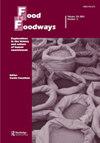Fascist foodways: Ricettari as propaganda for grain production and sexual reproduction
IF 1.1
Q2 ANTHROPOLOGY
引用次数: 2
Abstract
Abstract Food connects people and land, a link that the Italian Fascist regime exploited through their seizure of local culinary culture for the promotion of national demographic goals. This article traces the connections between the regime’s concurrent drives for food production and sexual reproduction. It will show the propagandistic potential of recipes, and also the limits of top-down dietary change under dictatorship. Ricettari, propagandistic recipe pamphlets, blended public politics and private practices into a heady cocktail, one that cast autarkic cookery and sexual reproduction as valuable contributions to the Fascist state. These documents establish a clear link between the regime’s demographic policy and the autarkic campaigns in favor of Italian grain production. Cooking, the professed subject of ricettari, conveyed political neutrality—it falsely marked the documents as feminine and innocuous. So too did design: small and light, these stapled leaflets could be easily rolled up and stuck in an apron pocket. Portability thus insured that these documents could cross the threshold from the public rally to the private kitchen. Once there, they could directly address women, and attempt to modify their daily habits in ways that would change the body from the inside out. At stake in the ricettari lies a broader contribution to Food Studies in terms of food and politics: this unique form of ephemera reveals that the Italian Fascist regime took a pronatalist approach to cuisine.法西斯的饮食方式:Ricettari作为粮食生产和有性繁殖的宣传
摘要食物连接着人和土地,意大利法西斯政权通过夺取当地烹饪文化来促进国家人口目标,从而利用了这种联系。这篇文章追溯了该政权同时推动粮食生产和有性生殖之间的联系。它将展示食谱的宣传潜力,以及独裁统治下自上而下的饮食变化的局限性。Ricettari是一本宣传食谱小册子,将公共政治和私人实践融入了一种令人兴奋的鸡尾酒中,将自给自足的烹饪和性生殖视为对法西斯国家的宝贵贡献。这些文件在政权的人口政策和支持意大利粮食生产的自给自足运动之间建立了明确的联系。烹饪,这门饭的主题,传达了政治中立——它错误地将文件标记为女性化和无害。设计也是如此:这些装订好的传单小巧轻便,可以很容易地卷起并卡在围裙口袋里。因此,可携带性确保了这些文件可以跨越从公众集会到私人厨房的门槛。一旦到了那里,他们就可以直接称呼女性,并试图改变她们的日常习惯,从内到外改变身体。ricettari餐厅在食品和政治方面对食品研究做出了更广泛的贡献:这种独特的昙花一现表明,意大利法西斯政权对美食采取了一种前生主义的做法。
本文章由计算机程序翻译,如有差异,请以英文原文为准。
求助全文
约1分钟内获得全文
求助全文
来源期刊

Food and Foodways
ANTHROPOLOGY-
CiteScore
2.20
自引率
0.00%
发文量
16
期刊介绍:
Food and Foodways is a refereed, interdisciplinary, and international journal devoted to publishing original scholarly articles on the history and culture of human nourishment. By reflecting on the role food plays in human relations, this unique journal explores the powerful but often subtle ways in which food has shaped, and shapes, our lives socially, economically, politically, mentally, nutritionally, and morally. Because food is a pervasive social phenomenon, it cannot be approached by any one discipline. We encourage articles that engage dialogue, debate, and exchange across disciplines.
 求助内容:
求助内容: 应助结果提醒方式:
应助结果提醒方式:


